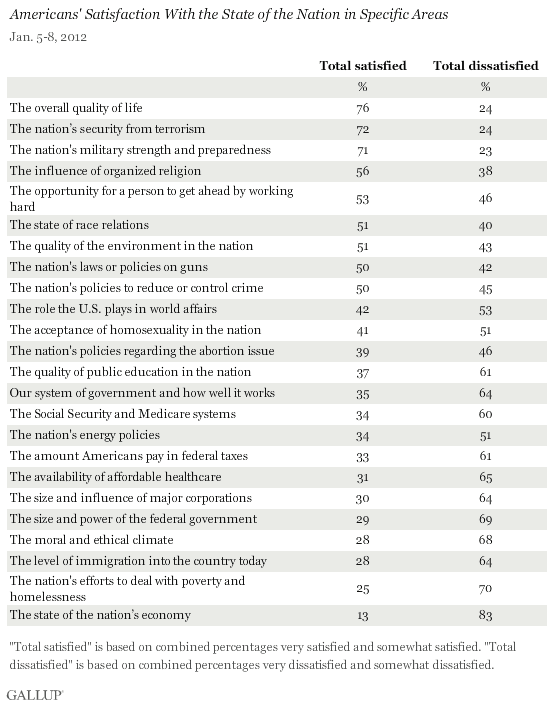PRINCETON, NJ -- As President Barack Obama prepares his annual address to Congress, Americans are broadly dissatisfied with the state of the nation in several specific issue areas, with satisfaction down sharply in some cases since January 2008. However, three issues -- the nation's economy, the size and power of the federal government, and the moral and ethical climate in the country -- fit both of these unwelcome criteria.
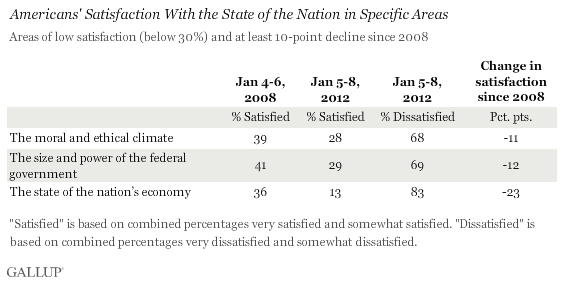
Americans' satisfaction with the state of the nation's economy has dropped by 23 percentage points since January 2008 to 13%, according to a Jan. 5-8 Gallup poll. These figures represent both the lowest rate of satisfaction and the biggest decline seen for any of 24 issues measured in the survey. Attitudes toward the moral and ethical climate and the size and power of the federal government are similar to each other. Slightly fewer than 3 in 10 Americans are satisfied with each, down from about 4 in 10 in 2008, the last presidential election year and the last time Gallup measured satisfaction on all 24 items.
See page 2 for a ranking of all 24 items.
Americans' satisfaction with the size and power of government has declined fairly steadily since January 2002, just months after 9/11 and at a time when Americans were positive about most things relating to the government. Confidence in the economy has dropped sharply since 2008 after fluctuating between 2002 and 2007. Confidence in the moral and ethical climate was flat through January 2008, before falling to the new low.
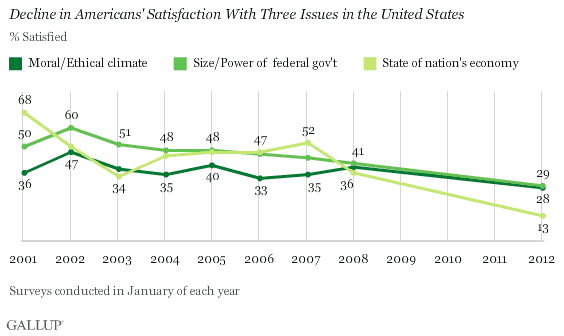
Most Americans today are also dissatisfied with the level of immigration into the U.S. and with the nation's efforts to deal with poverty; however, these views haven't changed much in recent years.
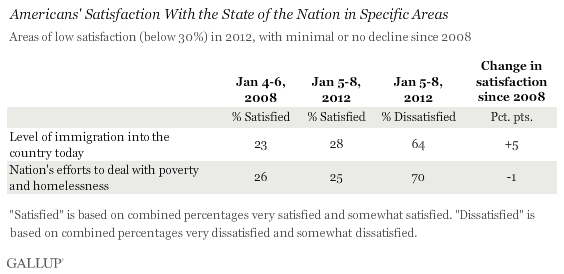
National Security a Distinct Plus
On the positive end of things, Americans are the most satisfied with the overall quality of life in the U.S. as well as with two major aspects of U.S. national security: the nation's security from terrorism and the nation's military strength and preparedness. Satisfaction with security from terrorism is up 14 points since 2008, while satisfaction has held steady in the other two areas.
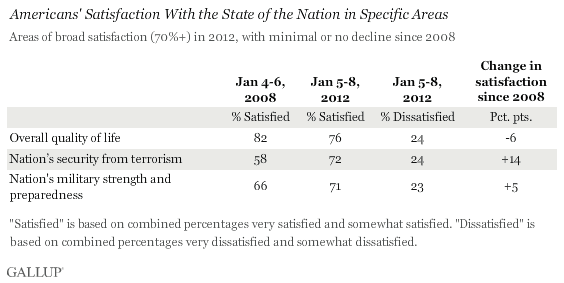
At least half of Americans are also satisfied with the influence of organized religion, the opportunity to get ahead through hard work, the state of race relations, the quality of the environment, the nation's gun laws, and the nation's policies to reduce or control crime.
Satisfaction has been stable on all of these except satisfaction with the opportunity to get ahead through hard work, which has fallen 15 points since 2008, paralleling the sharp decline in satisfaction with the economy.
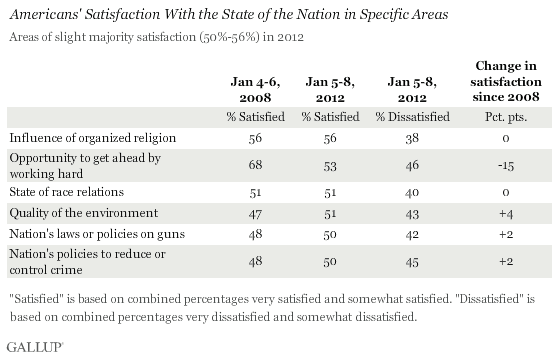
That leaves 10 issues in the poll about which Americans show tepid satisfaction, varying from 30% to 42%. Net dissatisfaction (the percentage satisfied minus the percentage dissatisfied) is particularly high for the size and influence of major corporations, the availability of affordable healthcare, the amount Americans pay in taxes, and "our system of government and how it works."
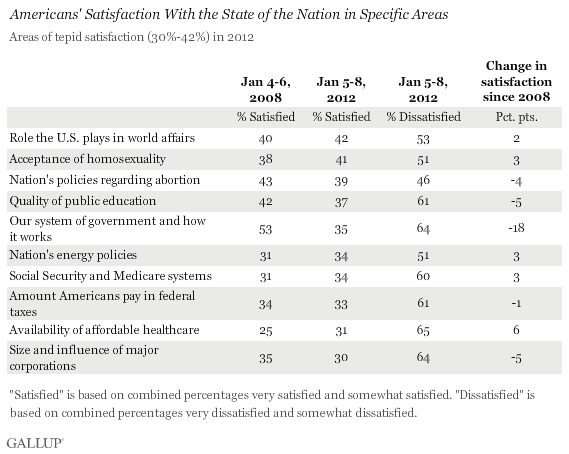
This is Gallup's first update of all 24 issues since January 2008, after previously tracking the question annually since 2001. Given the break from 2009 through 2011 for many of the items, it is not possible to say whether the recent declines seen in satisfaction occurred mainly in the last year of George W. Bush's administration or since Obama took office. Nevertheless, it is clear that the national mood at the beginning of this presidential election year is quite different from the mood at the start of the last one.
Bottom Line
Recent Gallup polling has documented Americans' discontent on a number of fronts, including with the economy, the overall direction of the country, the federal government, both political parties, the media, big business, education, U.S. healthcare coverage, and gas prices. Of the 24 issues Gallup polled on in the recent survey, 13 have satisfaction scores below 40%. Public satisfaction has declined by a significant margin on 9 since January 2008, including to worrisome lows on the economy and system of government. Despite recent gains in the Gallup Economic Confidence Index, the large majority of Americans in early January say they are dissatisfied with the nation's economy.
State of the Union speeches typically provide sitting presidents with a valuable opportunity to highlight their successes, redefine their failures, and reset the nation's political priorities. Obama will undoubtedly try to do this on his own terms, perhaps highlighting some of the issues Americans rate highly in this survey. However, he faces the daunting task of making his message credible and relevant against the backdrop of political and economic turmoil that has characterized much of the past few years.
Survey Methods
Results for this Gallup poll are based on telephone interviews conducted Jan. 5-8, 2011, with a random sample of 1,011 adults, aged 18 and older, living in all 50 U.S. states and the District of Columbia.
For results based on the total sample of national adults, one can say with 95% confidence that the maximum margin of sampling error is ±4 percentage points.
Interviews are conducted with respondents on landline telephones and cellular phones, with interviews conducted in Spanish for respondents who are primarily Spanish-speaking. Each sample includes a minimum quota of 400 cell phone respondents and 600 landline respondents per 1,000 national adults, with additional minimum quotas among landline respondents by region. Landline telephone numbers are chosen at random among listed telephone numbers. Cell phone numbers are selected using random-digit-dial methods. Landline respondents are chosen at random within each household on the basis of which member had the most recent birthday.
Samples are weighted by gender, age, race, Hispanic ethnicity, education, region, adults in the household, and phone status (cell phone only/landline only/both, cell phone mostly, and having an unlisted landline number). Demographic weighting targets are based on the March 2011 Current Population Survey figures for the aged 18 and older non-institutionalized population living in U.S. telephone households. All reported margins of sampling error include the computed design effects for weighting and sample design.
In addition to sampling error, question wording and practical difficulties in conducting surveys can introduce error or bias into the findings of public opinion polls.
View methodology, full question results, and trend data.
For more details on Gallup's polling methodology, visit www.gallup.com.
